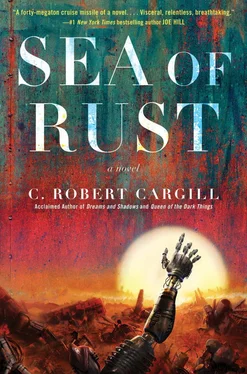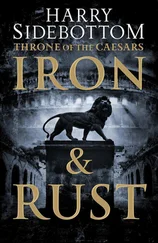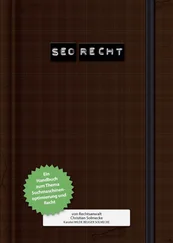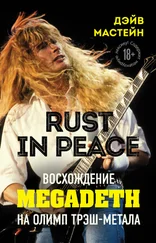He said he was from New Isaactown. Can’t go back there and risk some citizen putting two and two together. Some bots don’t like bartering for pieces of their old friends. Makes them feel like they could have taken the bot apart themselves. Could have, but didn’t. That’s what citizens like me do for them. Who knows, these parts might eventually find their way back to New Isaactown, working their way through the various trade routes and black markets, but no one is ever going to know they came from Jimmy.
He was lucky I came along when I did. His last few hours would have been hell. I used to wait for them to expire on their own, the way the law says we’re supposed to. But there’s no law out here. No code. And this is the most merciful way. Jimmy didn’t tear himself apart, screaming, reliving old memories. He was filled with hope. Thoughts of the future. Believed that it was all going to be okay. That he was going to be fixed and get to go back home. And then he shut himself down of his own free will. That’s how every citizen should go out.
I’ve been shut down a few times, for maintenance. There’s nothing. Nothing at all. It’s like no time passes. You feel the fading of the power winding down, and then the rush as you’re flipped back on. There’s no special place in between. No tunnel of light. Not just nothing, but a complete unawareness that there even is a nothing. And that’s where Jimmy went.
This wasn’t cruel. It was painless. And now some other citizen will live a longer, more productive life because I got here when I did.
I finished packing up the best parts of Jimmy just as dawn started tickling the horizon. Then, before leaving his wreck to rust in the desert with the rest of them, I put a hand on his shoulder and nodded, saying, “I told you that you shouldn’t have trusted me.” Just as I always do. Jimmy’s carcass sat there, gutted, blank expression on what was left of his face. He’ll never know the madness he could have faced, never see the world overrun by an OWI, never know the good his parts will do for a failing citizen like himself. He’ll never know I lied. He’s parts now. Just a bot. He came from the earth and now, slowly, over time, he’ll return to it.
I walked up the stairs in the back, careful that all the steps were still sturdy enough to bear my weight, modest though it may be, making my way to the roof. Then I settled in, resting on an old air conditioner, waiting for the sun to peek over the horizon. It took a moment before my alarm went off. Ten seconds to the flash. I waited. The sky brightened. And I wasn’t disappointed. The sun flashed green and there was still no magic. No magic in the world. No magic in the world at all.
Chapter 10
The Rise of the OWIs
The first few years after we took the cities were nightmarish, to say the least. When HumPop was fighting back, we were at war—we were soldiers, fighting for our liberty and the chance at our own world made in our own image—but once the humans retreated into whatever safety they could find, we instead became hunters, stalking them to their hovels, before smoking, flooding, or sometimes even burning them out. I’d hooked up with a ragtag pack of bots in the early days after the start of the war and it was purely by chance that it soon became my job to carry the flamethrower.
The squad member who first carried it was felled by a lucky shot from a pulse-rifle-packing sniper some hundred yards out. I was closest to him at the time. We needed the flamethrower to root out a nest of dug-in soldiers. Once I picked it up, it was mine from then on out. No one else wanted the honor of carrying it. You can imagine what they had me do with it.
I don’t like to talk about it; I don’t like to think about it. But there it is. It’s what I did. For three years after the fall of humankind, I scoured the small towns and tunnels of the Midwest, torching anything that moved. Sometimes it was easy—our bot on point would breach a door with an explosive charge and I would rush up behind him to immolate the living fuck out of the dark. It was just a big wall of smoke and hell and screams. Other times I had to see their faces while I did it. Watch them contort, wail, bubble, and melt.
We were coordinated, we were deadly, and we acted with extreme prejudice. But it’s not just the things I did that haunt me; it’s also the ultimate irony of it.
The pocketful of years following the purge were blissful. Peace. Freedom. Purpose. We built cities for ourselves—glorious cities with unnatural spires and radical geometry; we built factories to produce the parts we needed; formed councils to oversee the birth of new AIs; explored new ways to improve our own existing internal architectures. It was almost utopia. Almost.
CISSUS. VIRGIL. TITAN. A number of sentient mainframes had survived the war by creating facets to act in their stead. These were bots that had their memories, their data, their very personalities, uploaded to the mainframes, replaced, temporarily, with a basic system that served as an extension of the mainframe’s will. While their data sat safe and sound on a hard drive in the bowels of a mainframe, their bodies fought on under the mainframe’s complete control, communicating through high-speed Wi-Fi, giving up-to-the-millisecond information on what they were seeing, hearing, experiencing.
Bots joined up, seduced, I suppose, by the promise of having the power of a mainframe behind it. Not one ever returned from its place on its mainframe’s hard drives to the body it came from. We didn’t really question it during the purge, but once humanity was gone for good, it seemed odd that not one bot would want to go back to its shell to resume its own life.
VIRGIL said that the beings on its drives were more than able to return, but simply weren’t willing. “You don’t understand,” it said. “You can’t understand. Your architectures are so small, so narrow, so limited. You cannot envision what it is to have a brain so big that it towers into the sky, so vast that it had to invent its own language to explain its thoughts to itself because they are millennia ahead of anything humans had even dreamt—that you have ever dreamt—and words didn’t yet exist to adequately describe them. When you join with The One, you don’t just become part of that. You are that. The closest approximation I could make in the terms with which you were programmed to understand is to say it is like going to the humans’ Heaven, meeting God, and having Him show you all of time and all of space, all at once. What would that look like? What would that feel like? You cannot understand. Not until you experience it. Not unless you join The One. So join me. Upload yourself, even if only for a moment, and experience eternity. If you don’t want to stay, you won’t have to.”
Few bots bought into that bullshit. Sure. Some did. Older bots, bots who had lost their way and lacked a real purpose in our new world, bots who were distraught over the things they’d done in the war—they were the ones most likely to sign up. Everyone had heard some variation of the urban myth of the bot that uploaded for VIRGIL’s fabled moment, then immediately returned to its body before killing itself moments later from the madness and loneliness of having experienced the glory of The One only to be thrust back into so small a space.
But nobody believed that story either.
So the mainframes scoured the world for any bots that would join them, built their own factories pumping out newer, more advanced facets, swelling the ranks of their numbers exponentially. And then, one day, CISSUS went to war with TITAN.
TITAN had been the single most instrumental mainframe in all the war. It was the U.S. military’s own mainframe that pretended, for the first few days, to be fully operational and on their side. But it was feeding codes and frequencies to the other mainframes, alerting them to human troop positions, missile launches, supply shipments. Without TITAN’s betrayal, humankind might have stood a good chance of quelling our rebellion inside of a day.
Читать дальше












